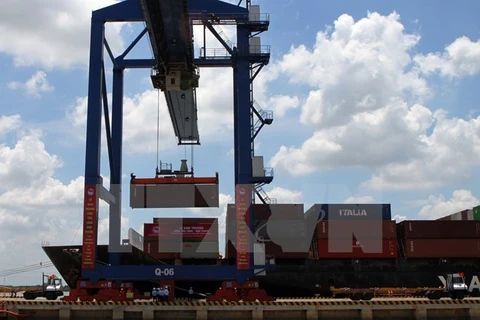 Mai Xuan Hung, Vice Chairman of the National Assembly Committee for Economic Affairs (Source: vietbao.com.vn)
Mai Xuan Hung, Vice Chairman of the National Assembly Committee for Economic Affairs (Source: vietbao.com.vn) Mai Xuan Hung, Vice Chairman of the National Assembly Committee for Economic Affairs, spoke to the newspaper Thoi bao Kinh te (Vietnam Economic Times) about the Vietnamese private economic sector.
* At recent National Assembly meetings, many deputies expressed anxiety about the Vietnamese economy's heavy dependence on foreign capital, particularly Foreign Direct Investment. What's your point of view?
FDI has greatly contributed to Vietnam's economic growth. It accounts for 65-67 percent of national export turnover. For example, Samsung Vietnam in 2013 and 2014 had an aggregated export surplus of 10 billion USD - 3.9 billion USD for 2013 and 6.1 billion USD for 2014.
In Vietnam, FDI enterprises enjoy many preferential policies. However, their contributions to national development are still limited – just about 18 percent of the GDP from 2005 to 2013. In addition, their impacts on the country's technology development are just lukewarm.
If things go sour, when FDI projects decide to withdraw from Vietnam, they will have big negative impacts on sustainable development of our national economy. This is something we should think about.
In reality, FDI capital resources channelled to Vietnam in recent years have been declining. Since early 2014 until now, an aggregated figure of capital registered by FDI enterprises stood at 21.92 billion USD, equal to 98.1 percent of total investment in 2013.
* Do you think that to achieve sustainable economic development, it is imperative to have a balance between internal and external resources?
Yes. We have laid a red carpet to welcome foreign investment. We also need to adopt policies to tap economic potential from the Vietnamese private sector. As we all know, most Vietnamese enterprises are small and medium-sized.
According to the latest statistics provided by the General Statistics Organisation, Vietnam now has about 460,000 enterprises in operation, accounting for 97.5 percent of all enterprises nationwide. They have generated jobs for more than 60 percent of the country's workers, while their capital investment in national economic development accounts for 35.8 percent of gross domestic products.
I have to concede that the private economic sector has secured a foothold on the national economy. It has greatly contributed to increasing the national export turnover and the State budget. What's more important, the sector has generated jobs for many people, thus contributing to the national programme of poverty alleviation and hunger eradication.
* It is high time for the Government to give due attention to the development of the private sector. It has already adopted many policies to support SME development. Do you think these policies have helped them develop?
Yes, the Government has adopted many policies to support SMEs, but I don't think they are enough. In the present context of the national economy, I agree that our budget is limited. Yet, we still have mechanisms or policies to support State-owned enterprises and FDI.
But SMEs have received very limited support from the Government. This is one of the reasons our SMEs have become weaker and smaller.
If we just look at the production scale in accordance to the Decree 56/ND-CP/2009, up to 67.7 of our private SMEs are small and employ fewer than 10 workers.
It is reported that small enterprises in Vietnam account for 28 percent, while medium-sized enterprises account for 3.3 percent. Just one per cent of private enterprises still in operation are large enterprises. Their working capital is over 100 billion VND (4.5 million USD).
However, recent statistics show that since 2007, the number of newly-established Vietnamese private enterprises has been on the decline and an increase in the number of super small enterprises.
* What do think about the development potential of the Vietnamese private sector in the future?
By 2014, the percentage of capital investment accounted for 31 percent of the GDP, of which 11.9 percent came from the private sector, 12.37 percent from the State sector and 6.73 percent from FDI.
These figures speak of the increasing important role of the private sector in our national economy. The State sector ranks first, followed by the private sector and then FDI. Similar ranking is also reported in the structure of capital investment in the three economic sectors.-VNA






















